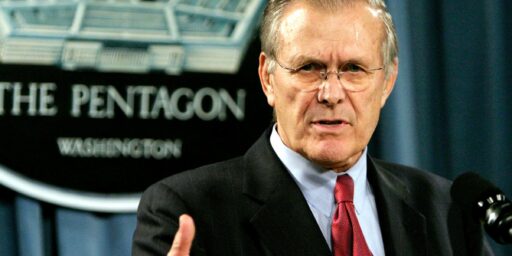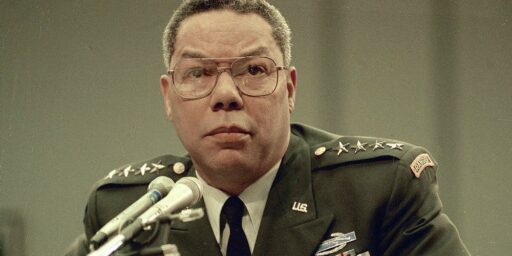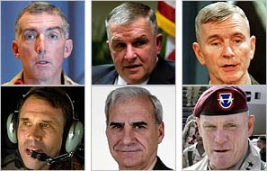Getting the Words Right
Anne Applebaum asks, “Why Can’t Bush Get the Words Right?” She notes that Bush, Rumsfeld, and Powell have all given answers on the WMD-intel question.
I don’t believe any of the three is a liar. Before the war there was, after all, a broad international, bipartisan consensus on the extent of Saddam Hussein’s weapons program. The Clinton administration had come to the same conclusions. The United Nations had come to the same conclusions. The events of Sept. 11, 2001, simply made the Bush administration feel a more urgent.
Correct. So what’s the problem? Well, people like Peggy Noonan and David Brooks, Republicans who support the president’s position, are unhappy with his technical skill in delivering a polished answer. But Applebaum correctly notes that something else is going on:
Part of the answer is that it’s not just what they say, it’s how they say it. Asked a difficult question, Rumsfeld leans back in his chair, looks at the ceiling and pauses a few seconds — at least appearing to think through his answer. Powell dispenses with the theatrics, but he speaks slowly and carefully, as if he knows his words matter. President Bush doesn’t pause, and he often answers too quickly, as if he doesn’t mind much what he says.
He also resorts too frequently to cliches. Asked whether the war has been worth the loss of 530 American lives, the president immediately said that “every life is precious.” Well, yes — but that could be the answer to a lot of questions. In that context, a generic answer makes the speaker sound as if he hasn’t really thought about the significance of the issue. But in any context, pat phrases — “Saddam Hussein was a madman” or “we still have a dangerous world” — serve to make complex issues sound too simple, which plays into arguments that the president is “stupid” and makes listeners wonder whether he’s concealing something.
But the problem isn’t only the president’s syntax. The problem is also his failure to acknowledge that anything has gone wrong. Powell admitted he “didn’t know” whether he would have recommended an invasion of Iraq had he known there were no stockpiles of weapons. Rumsfeld waved a satellite photograph of North Korea to emphasize how important it is that we have reliable information about other secretive regimes.
***
Politicians are believable, by contrast, when they speak as if they don’t really care what you think of them one way or another. That’s easier for Rumsfeld and Powell, neither of whom is running for reelection. But it ought to be pretty easy for the president, too, considering that he’s spent more than three years in the world’s toughest job. It’s a mystery why he still strives to sound like someone else.
Ironically, Bill Clinton had the skill to deliver bald faced lies so well that even people who knew he was lying to them seemed to enjoy it. Bush speaks the truth so poorly that he’s not convincing.





